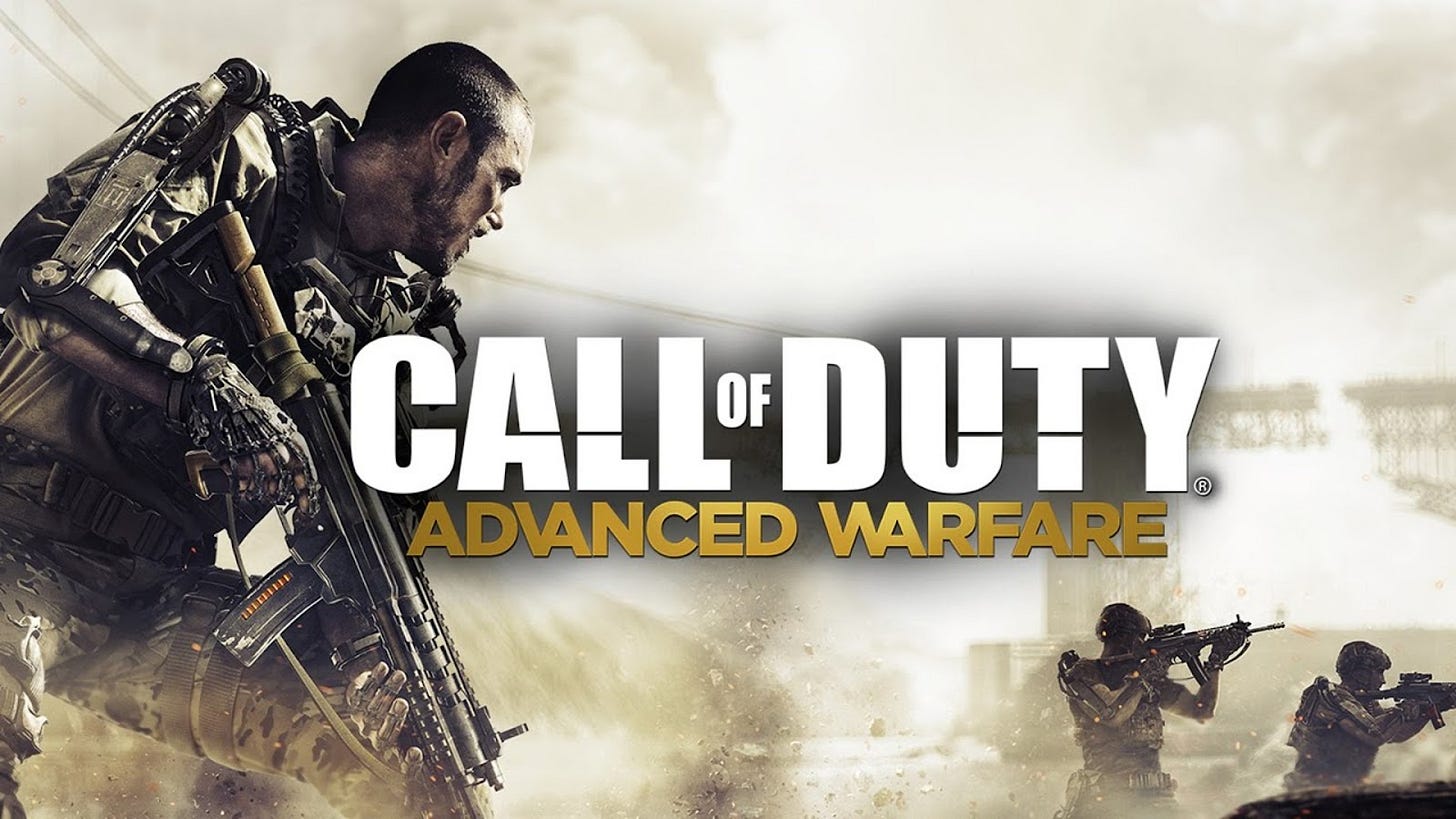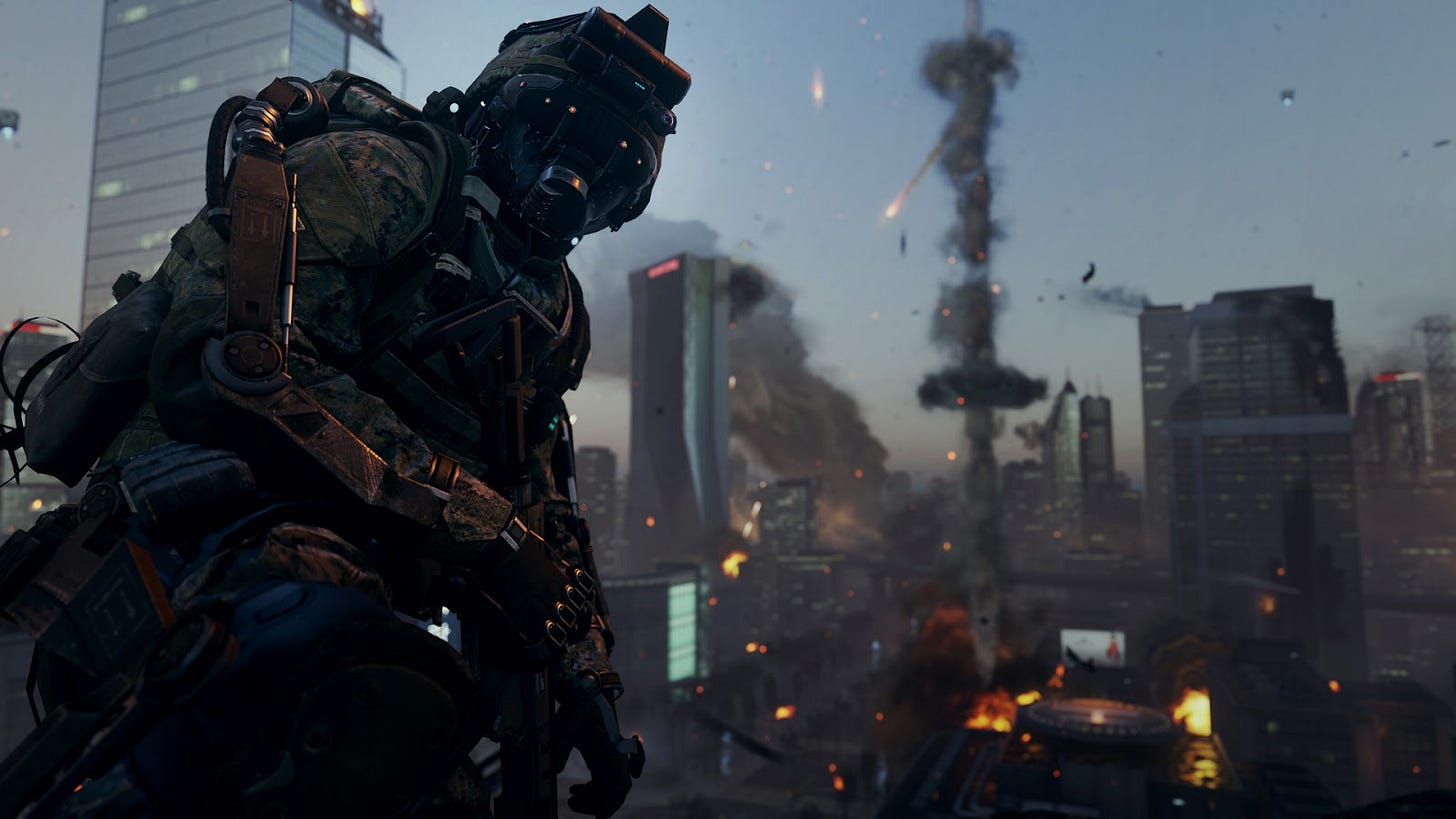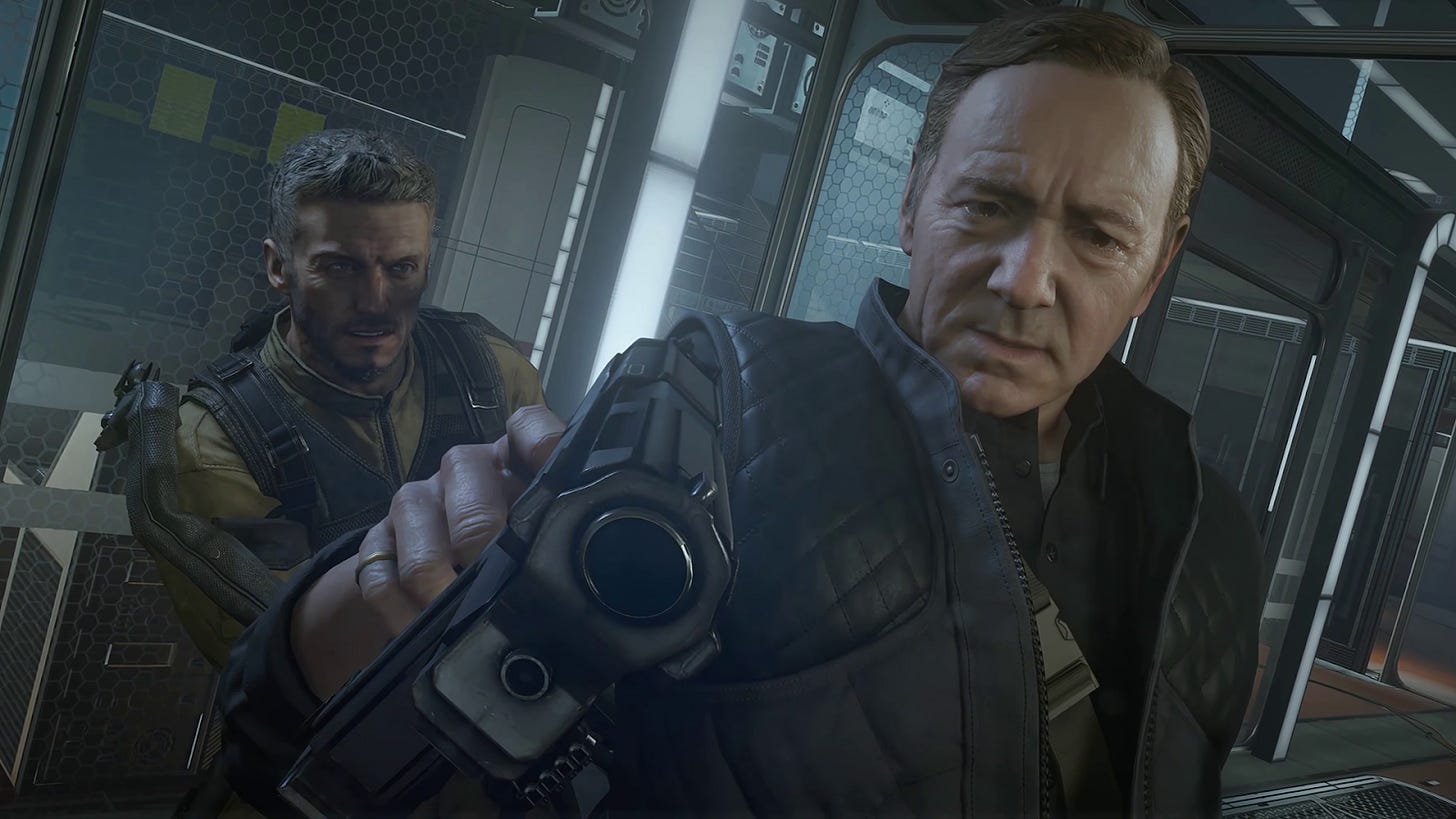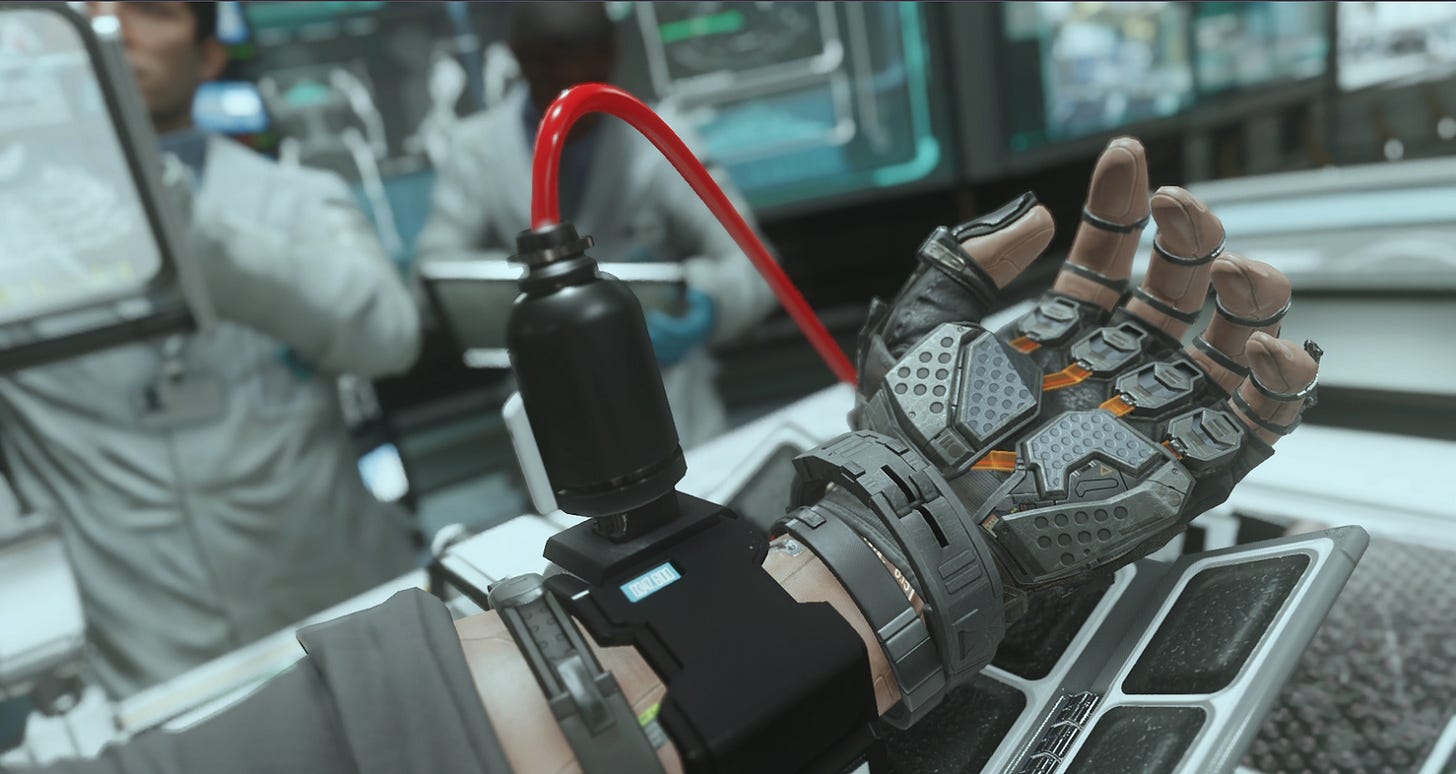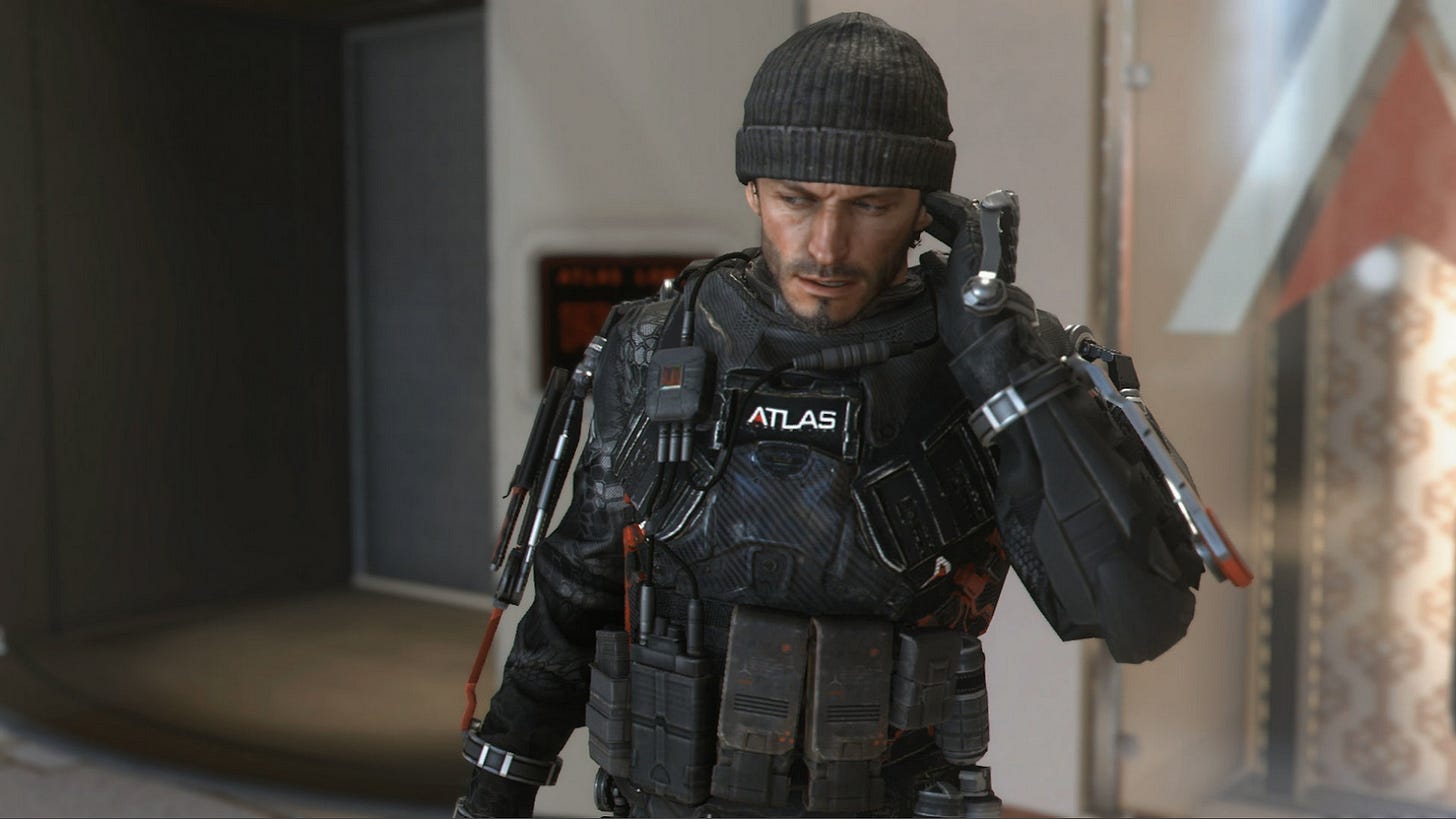Usually known as “the one with Kevin Spacey,” Call of Duty: Advanced Warfare is one of the more forgettable yearly installments of the franchise. It was released in 2014 (months after Titanfall had graced the sci-fi shooter scene) and is usually considered to be the low point in the “futuristic” side of the hallmark shooter, coming after Black Ops II and Ghosts, the latter of which panned despite being a launch title for both the Xbox One and the Playstation 4. It wasn’t long after Advanced Warfare’s release that fans were crying for a return to the “boots on the ground” action of earlier titles.
These reasons (and more) have deterred me from revisiting the game as often as other, flashier titles like Modern Warfare or Black Ops. But something drew me towards it, and I fired it up ten years after it launched. Far removed from the buzz that accompanies a current Call of Duty title, I had a very different reception of the game than I did when it first launched.
Picking up in the year 2054, you play as a private in the Marines named Jack Mitchell as you defend South Korea from a North Korean invasion. Soldiers in this vision of the future wear exo-suits that give them enhanced abilities: increased strength to rip off car doors to use as shields, and thrusters that can help bridge gaps or cushion falls. But things fall apart as Mitchell is critically wounded and his best friend is killed in action. You attend your friend’s often memed funeral and accept a job offer from his father, Jonathan Irons - CEO of a private military corporation named Atlas.
After getting a brand new prosthetic arm and all the cool, futuristic gadgets you could dream of, your squad skyrockets Atlas to international attention after successfully rescuing the Nigerian Prime Minister from a terrorist plot. When another terrorist attack on a nuclear reactor happens a year later, the private military of Atlas becomes the main fighting force of an international conflict that lasts for years.
[The following contains story spoilers for Call of Duty: Advanced Warfare.]
Mitchell’s world comes tumbling down around him when he finds that Jonathan Irons - his mentor, boss, and father figure - was warned about the attack on the nuclear reactor and let it happen so Atlas could be the first on the scene. Mitchell, along with a select few from his squad, defect and turn against Atlas, forming a resistance against the tech giant’s plans for world domination and leading to a climactic showdown with Irons to stop his doomsday plans.
The most striking difference between Advanced Warfare and the rest of the Call of Duty franchise is that your character is not a reluctant yet patriotic freedom fighter. Instead of fighting “for the greater good,” you work for a private military contractor that’s grown into a global peacekeeping force, which makes you feel dubious about having supported Atlas once it’s revealed that the conflict was engineered for maximum profit instead of protecting the world population.
The idea of having a private corporation in charge of the world’s largest military is also something that particularly resonates with a 2025 audience as Elon Musk rummages through the United States government at the behest of the president. It isn’t difficult to see a potential future in Advanced Warfare if this becomes the norm and we start handing the keys to our important infrastructure to companies chasing profits instead of governments who answer to its citizens.
The game also does something unique by giving you a disabled protagonist. Mitchell loses his arm at the end of the first mission, and having a prosthetic arm comes into play several times over the course of the story. This includes having it malfunction at several inconvenient points, but there’s also a moment towards the end of the story where Irons, enraged that you’ve turned against him, intentionally damages it while you’re captured. He mentions several times that he gave you the prosthetic arm and with it a second chance at being a soldier, implying that you owe him for it - therefore opening a whole can of worms about ableism in a world that prioritizes profit over prosperity.
Advanced Warfare is also just a lot more fun than I remember. The story is a high-stakes espionage thriller where your character is both on the front lines and behind the scenes, alternating between explosive, cinematic battles and quiet, tense stealth sections. One level has you providing sniper overwatch for the rest of your squad before the mission goes south, causing you to flee through streets as you dodge a skillful sniper that blasts through innocent civilians to get to you. Another set of levels has you deployed to the Golden Gate Bridge to stop a terrorist attack. As you prioritize helping civilians, you fail to stop the attack which blows apart the landmark, setting the stage for a massive naval battle as you defend San Francisco Bay from invasion.
One of my favorite aspects of the game is the performances of the voice actors, who also provided the motion capture for the game. Each character in the game is a fully rendered version of the human being who voiced that character, shining a spotlight on an often faceless profession. Troy Baker (Joel in The Last of Us, Booker in Bioshock: Infinite) plays the protagonist Mitchell while Gideon Emery (Fenris in Dragon Age II, Deucalion in Teen Wolf) plays Gideon, who supports you through most of the story. Along the way, you’re joined by Paul Telfer, Angela Gots, Russell Richardson, and Khary Payton on your way to take down Irons, played by the now-disgraced Kevin Spacey. This cast gives the story weight and gravitas that escalates it above the typical Call of Duty fare.
While it certainly doesn’t belong in a hypothetical “Gaming Hall of Fame,” Call of Duty: Advanced Warfare is a title that was perhaps too harshly received when it launched in 2014. Its themes have only become more relevant in 2025, and the gameplay is a lot more exciting and prescient now than it was a decade ago, lost in a sea of similar futuristic shooters. Revisiting this makes me wonder what other games have aged more gracefully than the industry originally thought. Have you had a game that you liked better the second time around? Let us know in the comments below!





